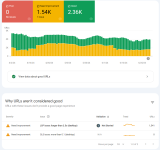I think ads is just a part of the total data collexcxting business (maybe even a small one at that), but knowing what sites you visit, what hardware you use, how much time you spend on each program you use, what options you most frequently use, what navigation shortcuts etc..
Well, I mean, there is front end vs back end right? The value of the data is both what it can be sold for to data brokers/aggregators, but also the increase in revenues from better more targeted ads.
You can't put a price on individual data points. By themselves they are worthless. But collated and cataloged usage data from millions of users with internet history or even media consumption history, that is worth a fortune, and it can be sold to multiple data brokers.
Absolutely. Not suggesting individual data points can be individually priced, but I'd be curious on average what my contribution to the revenues of an organization like Google or Facebook, or even a smaller website might be, if for no other reason than to figure out if my Patreon contributions are sufficient to offset the lost revenues from me using an ad blocker

The vast majority of the ads you see on the internet are not directly placed by the advertiser. They just buy 1.000.000 appearances or some number and the ad provider decides where those will appear and to whom.
My understanding is that there is actually a real-time "auction" between advertisers based on preset values of the type of users they want to reach and what their priority is every time you load a webpage. This is why despite our internet connections being orders of magnitude faster than they used to be, webpages are generally less responsive, as they do the whole ad auction algorithm before content is sent to the user.
And since advertisement is driven by your data, if you try boycotting you are basically boycotting your own interests.
I disagree with this. Just because an entity wants to drown out the competition and get their product in-front of me does not mean that they have my best interest at heart. They have
their best interest at heart, which is selling me their product so they can get their money, regardless of whether or not the product is actually the best one for me.
They could be a ****ty company selling a ****ty product and trying to influence/deceive me by having a bigger ad budget with glitzier advertising, and when you fall for this influence game (which we all do subconsciously, as even just seeing a brand more often in advertising makes it a known entity to our brains and likely to make us more positively inclined towards it, whether or not it is any good) you are actually working to the detriment of your own interests.
Advertising is an industry where psychologists have been studying the best ways to manipulate, trick and fool the masses into parting with their hard earned cash even when it is against their own best interests. We are all better off the fewer ads we see, even when they are targeted. They are literally designed on purpose to manipulate and mess with your head as much as they possibly can to get you to act against your own best interests and just choose them.
There is literally nothing positive about ads, even when targeted. They are a drag on society that harm people and inevitably influence them into making less rational decisions, even when they know better. (None of us, no matter how hard we try are immune from the basic biases of our monkey brains that these marketing psychologists have learned to manipulate)
My own best interests are to be free of biased information, manipulation and lies and instead research my choices when (and only when) I am ready to make a purchase in an as objective manner as possible.
Thus my interests are to keep my mind as unbiased as possible as I approach purchasing decisions, and to harm anyone trying to actively sell me anything either with pushy sales staff, door to door tactics or advertising as much as I can in order to disincentivize them from trying to do so in the future.
The
only businesses that are in my best interest to deal with are the ones who sit back, shut up, and let me come to them, and if I never do, then leave me the **** alone. I have literally never in my life benefited from learning about a product through an ad - even when that ad was targeted - and I likely never will.
If it were up to me any and all advertising would be illegal. All products would come in basic square brown packaging (that doesn't stand out on a shelf) with nothing but detailed specifications on them describing their objective attributes, which should be required to be backed by objective and unbiased tests reviewed by some form of agency put in charge of making sure the the claims are accurate (like FDA for drugs and medical products), before they can be placed on the market.
I would kill the practice of branding completely, in all ways except for basic recognition of a designer/manufacturer so you know what you are getting. No pictures, no cool graphics or jingles, no conjured up life styles, no fancy packaging, just objective performance criteria.

